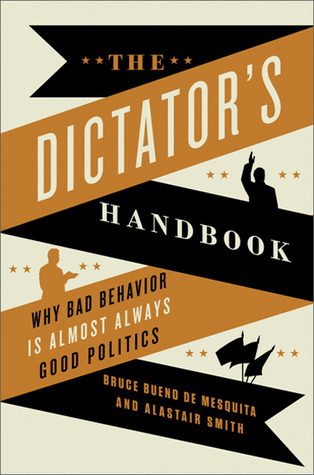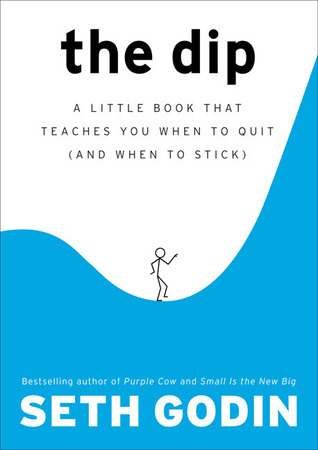
The Dictator's Handbook: Why Bad Behavior Is Almost Always Good Politics
by Bruce Bueno de Mesquita
30 popular highlights from this book
Key Insights & Memorable Quotes
Below are the most popular and impactful highlights and quotes from The Dictator's Handbook: Why Bad Behavior Is Almost Always Good Politics:
“Leaders never hesitate to miscount or destroy ballots. Coming to office and staying in office are the most important things in politics. And candidates who aren’t willing to cheat are typically beaten by those who are. Since”
“Paying supporters, not good governance or representing the general will, is the essence of ruling. Buying loyalty is particularly difficult”
“The world of politics is dictated by rules.”
“Every type of politics could be addressed from the point of view of leaders trying to survive.”
“There is never a point in showing your hand before you have to; that is just a way to ensure giving the game away.”
“Democracies are not lucky. They do not attract civic-minded leaders by chance. Rather, they attract survival-oriented leaders who understand that, given their dependence on many essentials, they can only come to and stay in power if they figure out the right basket of public goods to provide.”
“How do tyrants hold on to power for so long? For that matter, why is the tenure of successful democratic leaders so brief? How can countries with such misguided and corrupt economic policies survive for so long? Why are countries that are prone to natural disasters so often unprepared when they happen? And how can lands rich with natural resources at the same time support populations stricken with poverty? Equally, we may well wonder: Why are Wall Street executives so politically tone-deaf that they dole out billions in bonuses while plunging the global economy into recession? Why is the leadership of a corporation, on whose shoulders so much responsibility rests, decided by so few people? Why are failed CEOs retained and paid handsomely even as their company’s shareholders lose their shirts? In”
“It’s always better for a ruler to determine who eats than it is to have a larger pie from which the people can feed themselves.”
“This is the essential lesson of politics: in the end ruling is the objective, not ruling well.”
“There's nothing better than a rigged election, so long as you're the one rigging it.”
“The three most important characteristics of a coalition are: (1) Loyalty; (2) Loyalty; (3) Loyalty.”
“For autocrats, money spent on people—like infants and little children—who are years away from contributing to the economy is money wasted. Resources should instead be focused on those who help the ruler stay in power now, not those who might be valuable in the distant future.”
“Lee Kuan Yew ruled Singapore from 1959 until 1990, making him, we believe, the longest serving prime minister anywhere. His party, the People’s Action Party (PAP), dominated elections and that dominance was reinforced by the allocation of public housing, upon which most people in Singapore rely. Neighborhoods that fail to deliver PAP votes come election time found the provision and maintenance of housing cut off.18 In Zimbabwe, Robert Mugabe went one step further. In an operation called Murambatsvina (Operation Drive Out the Rubbish), he used bulldozers to demolish the houses and markets in neighborhoods that failed to support him in the 2005 election.”
“Autocrats can avoid the technical difficulties of gathering and redistributing wealth by authorizing their supporters to reward themselves directly. For many leaders, corruption is not something bad that needs to be eliminated. Rather it is an essential political tool. Leaders implicitly or sometimes even explicitly condone corruption. Effectively they license the right to extract bribes from the citizens. This avoids the administrative headache of organizing taxation and transferring the funds to supporters. Saddam Hussein’s sons were notorious for smuggling during the 1990s when Iraq was subject to sanctions. They made a fortune from the sanctions that were supposed to harm the regime.”
“Though private rewards can be provided directly out of the government’s treasury, the easiest way to compensate the police for their loyalty—including their willingness to oppress their fellow citizens—is to give them free rein to be corrupt. Pay them so little that they can’t help but realize it is not only acceptable but necessary for them to be corrupt. Then they will be doubly beholden to the regime: first, they will be grateful for the wealth the regime lets them accumulate; second, they will understand that if they waver in loyalty, they are at risk of losing their privileges and being prosecuted.”
“Borrowing is a wonderful thing for leaders. They get to spend the money to make their supporters happy today, and, if they are sensible, set some aside for themselves. Unless they are fortunate enough to survive in office for a really long time, repaying today’s loan will be another leader’s problem. Autocratic leaders borrow as much as they can, and democratic leaders are enthusiastic borrowers as well.”
“After all, our experience tends to confirm that on one end of the political spectrum we have autocrats and tyrants—horrible, selfish thugs who occasionally stray into psychopathology. On the other end, we have democrats—elected representatives, presidents, and prime ministers who are the benevolent guardians of freedom. Leaders from these two worlds, we assure ourselves, must be worlds apart! It’s a convenient fiction, but a fiction nonetheless.”
“Companies maintain lively web sites to put their view across but entrepreneur-owners have not stepped forward to do the same to help organize the mass of little owners and to provide a way for them to share views. Sure, there are bloggers writing about anything and everything, but there don’t seem to be shareholder-controlled sites to exchange thoughts and ideas about a company that participants own in common.”
“When addressing politics, we must accustom ourselves to think and speak about the actions and interests of specific, named leaders rather than thinking and talking about fuzzy ideas like the national interest, the common good, and the general welfare. Once we think about what helps leaders come to and stay in power, we will also begin to see how to fix politics. Politics, like all of life, is about individuals, each motivated to do what is good for them, not what is good for others.”
“Taxation, especially in small-coalition settings, redistributes from those outside the coalition (the poor) to those inside the coalition (the rich). Small coalition systems amply demonstrate this principle, for these are places where people are rich precisely because they are in the winning coalition, and others are poor because they are not.”
“Hence, democracies escape Hobbes’s state of nature and autocracies generally don’t. Indeed, we can see just how dramatic the difference is in escaping the state of nature by looking at what happens when nature exercises its freedom to wreak havoc. We have in mind the consequences of natural disasters like earthquakes, cyclones, tsunamis, and drought. These certainly are not political events, but their consequences are the product of how rulers best allocate revenue and how people’s freedom to organize shape allocation decisions.”
“It is better to have loyal incompetents than competent rivals. Sometimes of course, having competent advisors is unavoidable.”
“Rule 1: Keep your winning coalition as small as possible. A small coalition allows a leader to rely on very few people to stay in power. Fewer essentials equals more control and contributes to more discretion over expenditures. Bravo for Kim Jong Il of North Korea. He is a contemporary master at ensuring dependence on a small coalition. Rule 2: Keep your nominal selectorate as large as possible. Maintain a large selectorate of interchangeables and you can easily replace any troublemakers in your coalition, influentials and essentials alike. After all, a large selectorate permits a big supply of substitute supporters to put the essentials on notice that they should be loyal and well behaved or else face being replaced. Bravo to Vladimir Ilyich Lenin for introducing universal adult suffrage in Russia’s old rigged election system. Lenin mastered the art of creating a vast supply of interchangeables. Rule 3: Control the flow of revenue. It’s always better for a ruler to determine who eats than it is to have a larger pie from which the people can feed themselves. The most effective cash flow for leaders is one that makes lots of people poor and redistributes money to keep select people—their supporters—wealthy. Bravo to Pakistan’s president Asif Ali Zardari, estimated to be worth up to $4 billion even as he governs a country near the world’s bottom in per capita income.”
“Hasta algunas de las obras de caridad más sencillas tienen consecuencias negativas que incrementan el control por parte del gobierno y la irresponsabilidad de este.”
“Of course, in rigged-election regimes everyone expects the vote counter, not the actual votes, to determine who won, just as was the case in some districts in Kenya in 1989. That’s how it works these days in Russia, in Turkey, in Venezuela, seemingly in Tanzania, and in lots and lots of other places, including in some situations in the United States.”
“Vladimir Putin, former member of the Soviet secret police (the KGB) and Yeltsin’s immediate successor, moved the political system sharply back from its emerging dependence on a large coalition and good governance. He made it much more difficult for opposition parties to compete by severely restricting freedom of assembly. He made it much more difficult for opposition candidates to get their message across by nationalizing television and much of the print media. He made it much more difficult for people to articulate their dissatisfaction by making it a crime to make public arguments that disparaged the government. It seems he had many of his most effective opponents murdered, even reaching beyond Russia’s borders to do so. In short, he systematically reduced the availability of freedoms that compel a democratic government to attend to the wishes of the people.”
“Autocrats dislike freedoms because they make it easy for people to learn of their shared misery and to collaborate with each other to rise up against the government. Given their druthers, autocrats eliminate freedom of assembly, a free press, and free speech whenever they can, thereby insulating themselves from the threat of the people.”
“Sure, freedom means that different people can express different points of view, that they are polarized politically. Better to debate the issues that create polarization than to suppress dissenting opinions, pretending that everyone agrees with whatever the government leaders do for their own good. Large-coalition governments are about easily throwing the rascals out; they are not about consensus. Dictatorships, as the word indicates, dictate consensus and punish those who openly disagree.”
“In a phenomenon often called the resource curse, nations with readily extractable natural resources systematically underperform nations without such resources.19 Resource-rich nations have worse economic growth, are more prone to civil wars, and become more autocratic than their resource-poor counterparts.”
“Taxes are one of the great antidotes to stress for heads of governments. Taxes, after all, generate much-needed revenue, which can then be used to reward supporters. As a general principle, leaders always want to increase taxes. That gives them more resources with which to reward their backers—and, not to be forgotten, themselves.”


